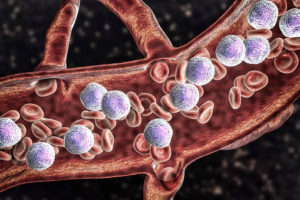Enaisdenib inhibits isocitrate dehygrogenase 2 (IDH2)-mutant activity and was approved by the FDA in 2017 for patients with refractory or relapsed IDH2-mutant acute myeloid leukemia (AML). Researchers at Stanford observed that the majority of patients with IDH2-mutant AML whose blast counts did not improve with enasidenib experienced increases in their peripheral blood counts and did not need red blood cell transfusions. In order to investigate the mechanism of this phenomenon, researchers exposed cultured hemopoetic progenitor cells to enasidenib and/or other IDH1/2 inhibitors. Enasidenib increased erythroid differentiation in hematopoietic stem cell progenitors and was dependent on erythropoietin signaling but independent of IDH2. Furthermore, enasidenib was found to act on mature CD71+ erythroid progenitors by inhibition of the ATP Binding Cassette Subfamily G Member 2, leading to an increased precursor to heme (protoporphyrin IX), and thereby enhancing erythroid differentiation. Clinical trials are underway to determine if enasidenib can be used to treat other clinical causes of anemia and decrease the transfusion burden in a wide subset of patients.
Reference:

